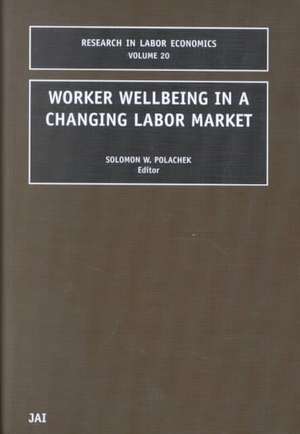Worker Wellbeing in a Changing Labor Market
Autor Solomon W. Polacheken Limba Engleză Hardback – 4 dec 2001
Preț: 1185.43 lei
Preț vechi: 1539.52 lei
-23% Nou
Puncte Express: 1778
Preț estimativ în valută:
226.84€ • 237.43$ • 188.80£
226.84€ • 237.43$ • 188.80£
Carte tipărită la comandă
Livrare economică 31 martie-14 aprilie
Preluare comenzi: 021 569.72.76
Specificații
ISBN-13: 9780762308330
ISBN-10: 0762308338
Pagini: 452
Dimensiuni: 167 x 239 x 31 mm
Greutate: 0.81 kg
Ediția:New.
Editura: Emerald Publishing
ISBN-10: 0762308338
Pagini: 452
Dimensiuni: 167 x 239 x 31 mm
Greutate: 0.81 kg
Ediția:New.
Editura: Emerald Publishing
Cuprins
Preface (Soloman W. Polachek). Inter-generational labor market and welfare consequences of poor health (T.J. Kniesner, A.T. LoSasso). The effect of health on employment transitions of older men (D.M. Blau, D. B. Gilleskie). Abuse and work among poor women: evidence from Washington State (M.W. Smith). Early test scores, school quality and sex: longitudinal effects on wages and employment outcomes (J. Currie, D. Thomas). School quality and the distribution of earnings (E.R. Eide, M.H. Showalter). Worker training in a restructuring economy: evidence from the Russian transition (M.C.Berger, J.S.Earle, K.Z.Sabirianova). A comparison of the human capital and signaling models: the case of the self-employed and the increase in the schooling premium in the 1980's (M. Lofstrom). Do returns human capital equalize across occupational paths? (J.A.Freeman, B. T. Hirsch). Has compensation become more flexible? (S.A Cannon et al.). Skill based technical change and trends in employer size effects (T. Idson). Employment of women and demand-side forces (D.K. Ginther, C. Juhn). Revising women's preferences about future labor force attachment: what effect do they have on earnings, and what are they affected by? (B. Sen). Getting ahead: the determinants of and pay-offs to internal promotion for young U.S. men and women (D. A. Cobb-Clark). Looking again at instrumental variable estimation of wage models in the gender wage gap literature (A. Kunze). Less-skilled workers, welfare reform, and the unemployment insurance system (C.K. Gustafson, P.B. Levine).











